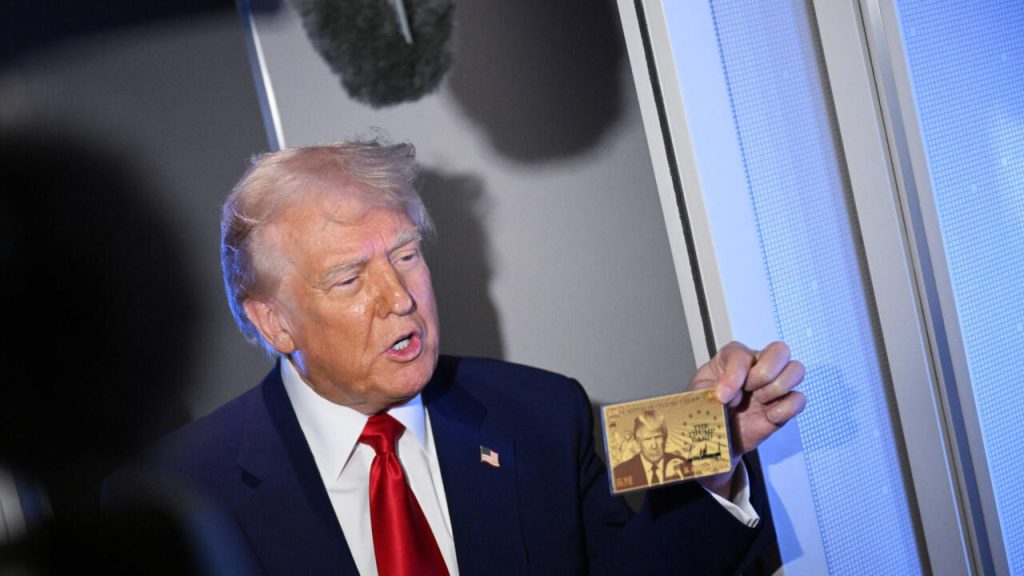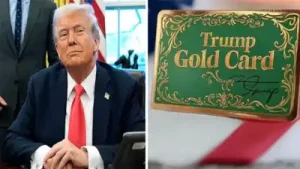In a headline-grabbing announcement, U.S. Commerce Secretary Howard Lutnick revealed this week that 1,000 of the newly introduced “Trump Gold Cards” have been sold—raising a staggering $5 billion in just one day. Each card, priced at $1 million, grants wealthy foreign nationals permanent residency in the United States. The initiative, launched in February 2025 by President Donald Trump, is being positioned as a replacement for the traditional EB-5 investor visa program.
While supporters praise it as an innovative economic solution, critics argue it transforms U.S. residency into a luxury commodity available only to the global elite.
Trump’s Gold Card: The New Pathway to U.S. Residency
The Trump Gold Card is being marketed as a premium alternative to the EB-5 visa, which required foreign investors to put in $800,000 to $1 million into American businesses that create at least ten jobs. In contrast, the Trump Gold Card demands a much higher upfront investment of $1 million, but it offers a simpler and more direct path to permanent residency. Essentially, it’s a fast track into America for those who can afford it.
Unlike the EB-5, which focused on job creation, the new initiative shifts focus toward immediate capital generation for the U.S. economy. According to Lutnick, this move alone generated $5 billion on day one—and that’s just the beginning.
Can Gold Cards Solve the U.S. Debt Crisis?
The U.S. national debt currently sits at a record high of $36.22 trillion, growing at an astonishing rate of nearly $5 billion per day. Lutnick argues that if the government sells 200,000 Trump Gold Cards, each at $1 million, the resulting $1 trillion could significantly reduce the debt. Scaling the program further—say, to 10 million cards—could theoretically wipe out the entire debt and inject an additional $50 trillion into the economy.
The potential fiscal benefits are clear. But the question remains: at what cost to national values and public trust?
A Modern ‘Golden Visa’—But at What Ethical Price?
The Trump Gold Card closely mirrors “Golden Visa” programs offered by countries like Portugal, Spain, the UAE, and Italy. These countries allow foreign nationals to obtain residency by investing in real estate or local businesses. However, critics argue that implementing such a model in the U.S. fundamentally alters the principles on which the nation’s immigration policy is built.
Historically, the U.S. has promoted immigration as a pathway to opportunity, innovation, and cultural diversity. Introducing a “pay-to-stay” model may undermine those ideals. Instead of welcoming immigrants for their skills, work ethic, or humanitarian need, the Trump Gold Card caters strictly to the ultra-wealthy.
Residency Without Responsibility?
A major concern is that most Gold Card holders may never become fully integrated into American society. Although they have the right to apply for citizenship, Lutnick himself suggested many will avoid doing so in order to escape U.S. tax obligations. This creates a system where individuals enjoy the privileges of residency—access to the U.S. market, lifestyle, and legal protection—without contributing to taxes or civic duties.
This dynamic could erode the traditional sense of national unity and shared responsibility. Is America welcoming new residents—or simply selling access to its benefits?
Housing Market Impact & Social Divide
With wealthy foreign investors entering U.S. markets through the Trump Gold Card, the housing market could feel the pressure. High-end buyers may drive up property prices in major cities and attractive locations, worsening affordability for local, middle-class Americans.
This could lead to further gentrification, pricing out longtime residents and increasing the already wide gap between the rich and the working class. In essence, it might deepen existing economic divides under the guise of fiscal recovery.
Security and Oversight: Will It Be Enough?
Though background checks are reportedly part of the process, critics fear the program could attract individuals with questionable intentions. Without rigorous vetting and ongoing oversight, the Gold Card could be exploited by those seeking to bypass traditional security protocols.
Maintaining the program’s integrity will require strict regulation, transparency in approvals, and perhaps even public disclosure of cardholders in the interest of national security.
What’s Next: A Capitalist Future for Immigration?
While controversial, the Trump Gold Card represents a bold shift in how the U.S. may approach immigration and fiscal policy. It brings a capitalistic angle to a traditionally merit- and value-based system. Supporters argue it’s a smart way to leverage America’s global appeal, but opponents worry it sends the wrong message to the world.
Should U.S. residency be something that can be bought? And if so, what kind of society are we shaping for future generations?
The success—or failure—of this program will hinge on public reaction, long-term economic impact, and whether the administration ensures that financial ambition doesn’t eclipse American values.
Final Thoughts
The Trump Gold Card is more than just a visa—it’s a symbol of a shifting immigration narrative. Whether it becomes a visionary economic move or a cautionary tale of wealth-driven policy will depend on the balance between revenue generation and the preservation of national integrity.




